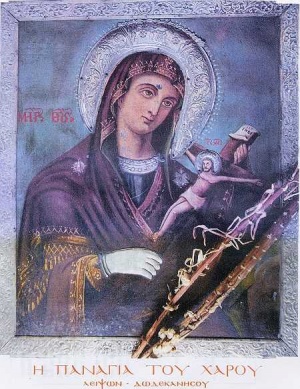Difference between revisions of "Panagia tou Harou"
m (+cleanup) |
|||
| Line 1: | Line 1: | ||
| + | {{cleanup|move to standardized name; grammar}} | ||
| + | |||
[[Image:panagia_tou_xarou.jpg|thumb|left|Icon of Panagia tou Harou]] | [[Image:panagia_tou_xarou.jpg|thumb|left|Icon of Panagia tou Harou]] | ||
Revision as of 20:58, May 1, 2008
At the church of St. John the Theologian, Leipsoi (Greece), dominates the icon (unique in all of the world) of the Virgin Mary, which is not holding the Holy Child but the Crucified Christ from where it derives its name Panagia tou Harou (Harou in Greek meanind death). The annual commemoration festival takes place August 23 where the island of Leipsi fills with visitors from all over the Dodecanese, to witness the procession of the icon around the entire islands and see the annual blossoming of the dead bouquet of lilies at the icon.
History
In the 1940s, a maiden was praying to the "Panagia tou Harou" icon (The Virgin Mary of Haron). Her prayers were met, so she placed a simple bouquet of lilies on the icon. The lilies withered and remained on the icon. The following year, the lilies blossomed and gave off a fragrance on August 23rd. Since then, every year on this day, the lilies blossom and give off a fragrance.
